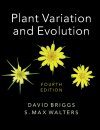Textbook
Out of Print
By: David Briggs(Author), Stuart Max Walters(Author)
512 pages, 10 b/w photos, 129 b/w illustrations, 40 tables
![Plant Variation and Evolution Plant Variation and Evolution]()
Click to have a closer look
About this book
Contents
Related titles
Recommended titles
About this book
Natural populations of plants show intricate patterns of variation. European botanists of the eighteenth and nineteenth centuries used this variation to classify different 'kinds' into a hierarchy of family, genus, and species. Although useful, these classifications were based on a belief in the fixity of species and the static patterns of variation. Darwin's theory of evolution changed this view; populations and species varied in time and space and were part of a continuing process of evolution. The development of molecular techniques has transformed our understanding of microevolution and the evolutionary history of the flowering plants. This new edition reviews recent progress in its historical context, showing how hypotheses and models developed in the past have been critically tested. The authors consider the remarkable insights that molecular biology has given us into the processes of evolution in populations of cultivated, wild and weedy species, the threats of extinction faced by many endangered species and the wider evolutionary history of the flowering plants as revealed by cladistic methods.
Contents
Preface
Acknowledgements
Note on names of plants
1. Looking at variation
2. From Ray to Darwin
3. Early work on biometry
4. Early work on the basis of individual variation
5. Post-Darwinian ideas about evolution
6. Modern views on the basis of variation
7. Breeding systems
8. Infraspecific variation and the ecotype concept
9. Recent advances in genecology
10. Species and speciation
11. Gradual speciation and hybridisation
12. Abrupt speciation
13. The species concept
14. Evolution: some general considerations
15. Conservation: confronting the extinction of species
Glossary
References
Index
Customer Reviews
Textbook
Out of Print
By: David Briggs(Author), Stuart Max Walters(Author)
512 pages, 10 b/w photos, 129 b/w illustrations, 40 tables
"[...] the book provides students with an easily gained insight and appreciation of just what it is that plant evolutionists do."
– Dan Schoen, Trends in Plant Science
"[...] a thought provoking and readable volume."
– John Warren, Scottish Agricultural College
"[...] suitable for university students in Environmental Sciences, Agricultural Sciences, Botany and Plant Biology. It is particularly a useful book for updates. The book is highly recommended for the professional practitioner in the field as a background, for plant physiologists and people in related fields it provides a thorough review of the field as it now stands. It may stimulate many new ideas in these areas."
– Vassiolios Sarafis, Journal of Plant Physiology
"There is no other comparable text available. As a textbook on variation in plants, this book is a classic."
– Journal of Applied Ecology





































